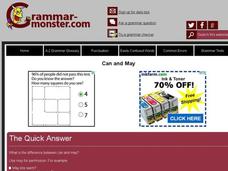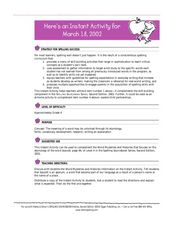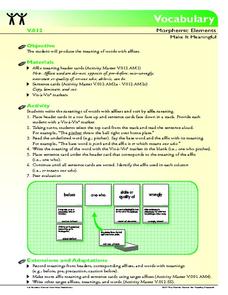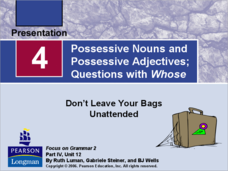English Linx
Context Clues Worksheet (Part 1) L.6.4a
Practice using context clues to determine the meaning of words. While the words in this activity are relatively simple, they will help ease pupils into the process of using context clues. Make the activity stronger by asking class...
Curated OER
Split Suffixes
Make new words by adding suffixes to word beginnings. There are four suffixes here: -ible, -able, -ive, and -ion. After using them to complete five given words, they use their vocabulary skills to apply the suffixes to words they think...
Curated OER
Identify Base Words and Suffixes to Read Multisyllabic Words #1
Show your scholars how adding an affix changes the entire meaning of a word; they focus on the suffix -able. You'll find a complete script here, but if you don't want to read this verbatim, use it simply as an outline. Learners watch you...
Curated OER
Easily Confused Words: Precede and Proceed
So many words are easily confused in the English language. Take precede and proceed, for example. Look at the example sentences provided here, and then have your learners take the short quiz. Have they mastered these vocabulary terms?
Curated OER
Easily Confused Words: Can and May
Can is one of the most commonly misused words. In actuality, may should be used in many of the sentences can tends to appear in. Review these example sentences with your third and fourth graders, and then have them complete the short,...
Curated OER
Choose Your Words Wisely
Improve word choice! Writers use dictionaries and thesauruses to aid them in choosing exciting words to incorporate in their writing. They rewrite sentences and practice identifying words that can be replaced using a better word. Flip...
Curated OER
Commonly Confused Words: More Homonyms
Understanding the spelling and meaning of homophones is particularly difficult for English language learners. This online quiz focuses on 20 different sets of homophones. The learner reads the sentence and decides which word fits best.
Curated OER
Unlocking Word Meanings
Fourth graders investigate eponyms in the English language. For this eponym lesson, 4th graders participate in a teacher led lesson on the definition of an eponym. They complete a worksheet in which they determine which eponym became...
Curated OER
Multiple Meaning Words
Using context clues is an important practice when deciphering words with multiple meanings. There are ten multiple choice questions in this PowerPoint to test students on reading the context of a sentence. Tip: Use this presentation...
Curated OER
Antonyms, synonyms and homophones
Shed light on what antonyms, synonyms, and homophones are. In this lesson, upper elementary schoolers create pairs using an antonym, a homophone, and/or a synonym. Then they play an antonym matching game.
Curated OER
Possessive Apostrophes
The apostrophe is a punctuation mark that is often incorrectly-used. This short, but effective, presentation addresses that fact. One way to use them is when showing possession in writing. Learners are coached on when to use possessive...
Curated OER
Revising Writing: Plain English
Eschew obfuscation! Using dictionaries, writers revise a complicated text so that it reads more simply and improves the clarity of the passage. Focusing on word meanings, they revise the sample worksheets and then present their...
Curated OER
Word Meanings From Context--Synonyms
In this synonyms activity, students look at each of the five words printed in italics before each selection and use context clues to identify and underline the synonym of each word.
Florida Center for Reading Research
Vocabulary: Morphemic Elements, Getting to the Root of It
Young readers learn how to get at the root of new vocabulary with this fun language arts activity. When working in pairs, children begin by matching unknown vocabulary words to their Greek or Latin roots. When all the vocabulary cards...
Florida Center for Reading Research
Vocabulary: Morphemic Elements, Make It Meaningful
Scholars learn to find meaning in words using affixes with a language arts activity. In pairs, children sort cards with printed sentences that include words with the prefixes mis- and pre- and the suffixes -er, -ness, and -able. Then,...
Lynette
Prefix, Suffix, and Root Word Worksheets
Words are kind of like a train, with affixes as the added cars. Practice prefixes, suffixes, and root words with these worksheets. Learners add words on to the beginning and end of words, practice with some roots, and use the words in...
Pearson
Possessive Nouns and Possessive Adjectives; Questions with Whose
Be as possessive as you like with a grammar slideshow on possessive nouns and adjectives. Whether it's your suitcase, my suitcase, or his suitcase, elementary learners decipher the ways that possessive nouns and adjectives can modify a...
Curated OER
Rudyard Kipling's Rikki-Tikki-Tavi: Mixing Words and Pictures
Create meaningful illustrations to accompany stories in a web-based art and literacy lesson focused on "Rikki-Tikki-Tavi" by Rudyard Kipling. The class takes a virtual art safari with the Museum of Modern Art and then discusses how...
Curated OER
Elementary School--Advanced Vocabulary
For this advanced vocabulary worksheet, learners study 20 words, write the word that is spelled correctly on the line after each number, read 10 additional sentences and choose the word in parentheses that completes each sentence...
Scholastic
Frindle Lesson Plan
"Who says a pen has to be called a pen? Why not call it a frindle?" Inspired by this quote from the award-winning novel written by Andrew Celements, this lesson allows children to invent their own terms for common classroom objects,...
SLP lesson Plans
Multiple Meanings
Expand your vocabulary unit with a worksheet that specifies the definition and part of speech of each word. Additionally, kids provide two sentences using the word in context.
K12 Reader
Proverbs and Adages: What’s the Meaning?
Your kids have probably heard these idioms before, but do they know what they mean? Help them learn that haste makes waste, an ill wind blows no good, and that ignorance is bliss with a list of popular expressions.
K12 Reader
St. Patrick’s Day Words
A St. Patrick's Day-themed learning exercise invites young leprechauns to match the word with its meaning by writing the corresponding letter in the blank. There are 10 words and definitions that are connected to Ireland. Lastly, pupils...
Education Center
Word Wise
Warm up your class at the start of the year by checking their ability to read and unpack dictionary entries. This worksheet asks pupils to pick apart a sentence that uses some pretty advanced vocabulary by using three dictionary...
Other popular searches
- Multiple Word Meanings
- Word Meanings in Context
- Foreign Word Meanings
- Word Meanings From Context
- Similar Word Meanings
- Clarify Word Meanings
- Vocabulary. Word Meanings
- Word Meanings Lesson Plans
- Glossary Word Meanings
- Meanings of Word Parts
- Word Meanings/definitions
- Multiple Word Meanings 4th

























